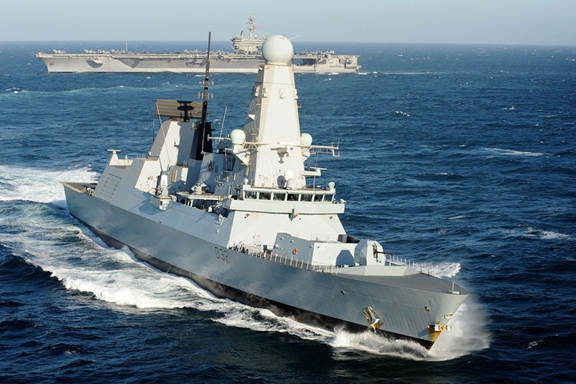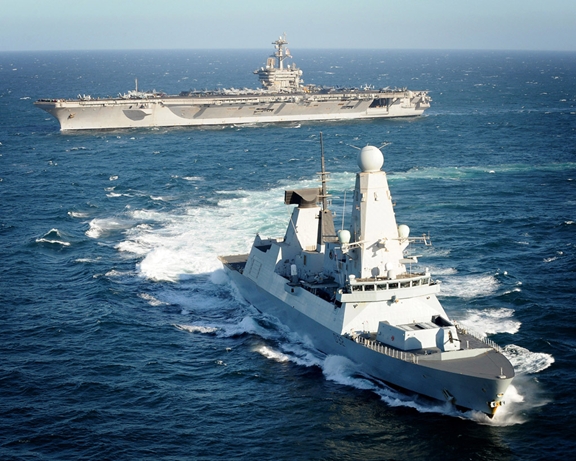

Posted on 03/20/2012 8:33:05 PM PDT by sukhoi-30mki
Daring enjoys ‘truly amazing’ experience working with American carriers
20/03/2012
Britain’s most advanced warship, HMS Daring, has worked with two American aircraft carrier groups as her Gulf mission steps up a gear. The new destroyer has been showing off her air defence and fighter control prowess with the USS Carl Vinson and Abraham Lincoln and their task groups.
Turning away from the most powerful surface ship in the world is the most advanced warship in the Royal Navy.
On her maiden deployment, HMS Daring has worked with not one but two US Carrier Strike Groups – here the USS Carl Vinson, but also her sister Abraham Lincoln.
The Portsmouth-based warship – the first of six cutting-edge Type 45 destroyers – has been exercising with both 100,000-ton flattops as she integrates with our closest allies.
That integration has taken the form of swapping sailors with several American ships, notably cruisers USS Cape St George and Bunker Hill, as well as the two carriers, allowing the two navies to share expertise and ideas and forge good working relationships.
The Carl Vinson leads US Carrier Strike Group One, while the Lincoln is the flagship of Group Nine (there are 11 such groups in all, comprising one carrier, one cruiser, two destroyers, one hunter-killer submarine and a support ship, plus an air group of more than 60 jets, helicopters and pistol-engined aircraft).
The culmination of this effort was HMS Daring working fully with the Carl Vinson and her impressive air wing of fast jets.
The Sampson radar (the spiky spinning egg atop Daring’s main mast) and command and control system allow multiple targets to be tracked to ranges of up to hundreds of kilometres. That information is fed to the Aster missiles in the silo on the ship’s forecastle.
With the Long Range Radar (the large black slab just forward of the ship’s hangar) it means Daring can track many thousands of air contacts giving her unprecedented surveillance of huge areas of air space.
Which means that she is a valuable asset for a US Carrier Strike Group providing such a comprehensive air picture of the complex Gulf airspace.
“Working with the US carriers and their air wings is the culmination of many months of training and hard work for the ship’s company,” explained Lt David Berry, one of two fighter controllers aboard Daring.
“For me, this is the pinnacle of my fighter controlling career and it is truly amazing to watch it all come together in this operational theatre.
"Taking control of F-18 Super Hornets in this busy operational environment is hugely rewarding.”
Daring is attached to the Combined Maritime Task Forces on a wide-ranging maritime security – tackling piracy, smuggling, people-trafficking, terrorism and other criminal activities – as well as working with Coalition and regional allies.
Daring’s not the only Royal Navy vessel to link up with a US carrier group. In the Arabian Sea – outside the Gulf – the Abraham Lincoln joined forces with Britain’s capital ship, HMS Westminster.
The Portsmouth-based frigate is also on a maritime security patrol of waters east of Suez – tackling piracy, smuggling, people-trafficking, terrorism and other criminal activities – while ‘Abe’ is conducting both that mission and supporting operations in Afghanistan, codenamed Enduring Freedom.



Cool pic. Sharp looking craft there.
The article says it is intersecting "the most powerful surface ship in the world." Isn't that the GHW Bush?
Just a quibble. Such a craft as the Daring probably doesn't fit into the Naval profile of the USA.
But cool is cool...
Pretty cool looking!
China is building a powerful navy, and I do worry about that — but the operational skill of controlling a carrier group takes years to develop. The US can do things no other nation can do, no matter how many ships the other nation may have.
Such as?.
Curious, as I am not a naval specialist.
Not sure I’d feel safe flying in one of those pistol engined aircraft. Maybe it’s just me.
Such as project the power of 85 combat ready aircraft with enough fire power to level a small country in a matter of hours. That’s the compliment of one American aircraft carrier. I believe there are currently 12 carriers in our Navy and we can do this anytime, anywhere we want. As Colin Powell once said, ‘’It means the power of the United Stats lies just over the horizon.’’
The DDG-51 class has roughly the same displacement with far greater capabilities. Notably absent from DARING is a land attack option.
Would someone enlighten me on how you can designate a ship as a “Destroyer” and it has only a single small caliber gun shown. What is it going to destroy?
No torpedos are shown. I presume there are some misiles - surface to surface, surface to air - but what abot surface to undersea? That tower makes for a handy target, visually and on radar.
This seems to be the old missiles vs. guns argument of the 1960s for aircraft. I thought that was settled in favor of guns when the F4H Phantom had to be equipped with a gun pod/internal gun.
Most destroyers and frigates built since 80s have had only one main gun. In the Daring’s case, it’s a 114mm gun, which is not terribly small compared to the 127mm guns used by the USN.
Like a lot of British projects, the Daring has been built with space for, but not with add-on weaponry due to funding issues. So it’s anti-sub capability is mostly provided by its helicopter.
HMS Daring’s anti-ship and anti-sub capabilities consist entirely of helicopter launched Sea Skua missiles. Our cheapskate government couldn’t be bothered to arm it properly, so they designed it ‘for but not with’ things like harpoon missile launchers, CIWIS, and sonar.
As it stands at the moment, the Type 45 is basically an air-defence destroyer, full stop. Apart from the gun and the helicopter, it has no other weaponised capabilities...
There are plans in the pipeline to upgrade the guns to 6.1 inch (155mm) weapons to bring it in line with the army’s self-propelled artillery pieces. But yeah, its pretty crap. Expensive crap too, £1.1 Billion a ship. We’d have been better off buying US Aegis ships. Apart from maybe a slightly better radar, this ship is a donkey, whose primary virtue is providing jobs for British engineers.
Like I said in an earlier thread, perhaps we’d have been better buying American, and ploughing all that money into a British space program instead...
Fair enough, but then, would the government (any democratic government for that matter) still plough back those savings into something of strategic benefit?
Another way for you to rationalise spending is to abandon the Trident programme and go for a cruise-based solution using attack submarines and aircraft.
Trident missiles based in subs are able to reach anywhere in the world, no matter how far inland, and cannot realistically be stopped. Cruise missiles have a more limited range and travel at subsonic speeds and could potentially be shot down before reaching their target. Britain’s nuclear deterrent would therefore be diminished.
Sub-based ballistic missiles are the only game in town when it comes to a reliable strategic nuclear deterrence...
Back in the 1960s-70s, the RN had to learn to euphemise how they refered to ship types in order to secure funding. ‘Battleships’ and ‘aircraft carriers’ ended up being scrapped, buy the late and lamented ‘Invincable’ class aircraft carriers survived by being referred to as ‘through-deck cruisers’ when they were being proposed to HM Government for construction.
The HMS Daring is actually more akin in size to an old cruiser, but the word ‘cruiser’ conjures up images of something big and expensive, so the RN, out of habit, prefers to refer to it as a destroyer. Even the Type 23 ‘Frigates’ we have in service are, at 4,900 tons, larger and heavier than the c.2,000 ton vessels that we used to call ‘destroyers’ during WWII...
Also, you are probably right about democratic governments. They tend to think short-term. And pols tend not to care about what happens beyond their next electoral term, which is why we get so much penny-pinching and poor procurement decisions, because the consequences of those decisions tend not to be felt until a decade or more later.
The only reason Britain is getting two full-sized aircraft carriers is because a lot of his constituents depend on Rosyth Dockyard, where much of the work on building them is being carried out. He sealed up the contract so tight that cancelling them would cost more than continuing with the work.
Cameron and Co would have loved to have cancelled the project but they can’t. Gordon Broon probably did this country the only favour he ever did by securing those contracts, admittedly for his own, selfish electoral reasons...
Well my point was only about cost-cutting!!! The UK really has little practical choice in this matter. Cutting Trident would mean a diminished strategic capability but it would in theory at least give greater latitude to conventional weapons capability.
ping
Click on pic for past Navair pings. Post or FReepmail me if you wish to be enlisted in or discharged from the Navair Pinglist. The only requirement for inclusion in the Navair Pinglist is an interest in Naval Aviation. This is a medium to low volume pinglist.
Could someone explain the circumstances/reasons wherein a CIC other than aboard the carrier would be controlling flight ops? I assume that if the carrier was damaged, if flight ops were out of commission, that control could flow to another ship in the battle group, as all are connected via data links, and in theory any one could then direct the battle. I know it makes good sense to train for any possibility in combat, but wouldn't the Hawkeye assume control of the air battle first.
I'd appreciate any insight anyone could provide, and/or any links that might explain this is greater detail.
Disclaimer: Opinions posted on Free Republic are those of the individual posters and do not necessarily represent the opinion of Free Republic or its management. All materials posted herein are protected by copyright law and the exemption for fair use of copyrighted works.